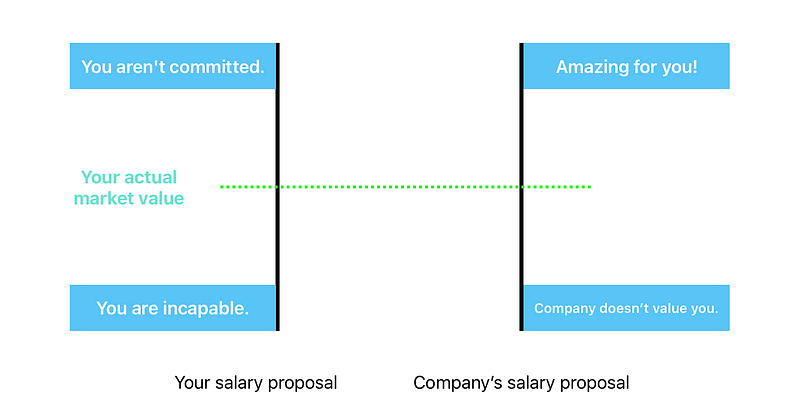Build confidence through Offer Negotiation
I learned a lot about building confidence through salary negotiation from my housemate today. Recently, I got an internship offer that is…
I learned a lot about building confidence through salary negotiation from my housemate today. Recently, I got an internship offer that is very confusing. The company is from a coworking space, and the offer is only one sentence.
Nothing more. No detailed job description. No salary. No start date. No duration. No salary. I was very very confused. When I followed up, they only told me “Sure! Let's chat on Wednesday!” All of it is so informal that scares me. To be very honest, based on how casual it is and they were even late for our past meeting. Wariness slips inside my excitement. I don’t even know about their funding status. How do I have the offer discussion when the page is blank?
Signals in salary negotiation
Let’s start with what I learned about salary negotiation. Initially, I don’t really care because I think I love the work and also the economy is bad. However, I learned that salary is not only about working, but important signal for work.
Scenario 1: The company gives you a high salary. That’s great!
Scenario 2: The company gives you a low salary that is too low. It means that they don’t value you and your time enough. Since they aren’t really committed to you, you might have problems with your work. I understood it because I was resentful to be treated as cheap labor without any respect at all.
Scenario 3: You set your salary really high and are not willing to lower it during the negotiation. It sends a signal that you want money more than the mission and the future of the company.
Scenario 4: You set your salary way too low. It means that you aren’t confident in yourself at all. Why would they hire you?
That is to say, I will need to figure out an appropriate range for my salary negotiation. Throughout the negotiation, I would also gain information on whether this is a good company to work for. For instance, if they took away my offer just because I couldn’t compromise a way too low salary, then I might not appreciate their ethics and management style working with them anyway.
How to set the salary range?
I ask my housemate how to set a reasonable salary range. He said my last internship. For me, it will be the job I did in Meta. Yet, lots of unconfidence thoughts coming up.
Me: “The economy is bad now. Should I discount it?”
Housemate: “No. He said. you just benchmarked with your latest work.”
Me: “I was in data science for three years. That’s why I got into Meta. But now, I am more like an engineer. They aren’t the same though.”
Housemate: “Engineer earns more than a data scientist in general, so you should ask for a higher salary than a data scientist. Go look up on Glassdoor.”
Me: “But I don’t have much engineering experience. Why should I get that salary?”
Housemate: “If they give you the offer. It means that they think you can do the job already. After we get the offer, we should not worry about the ability at all because we have passed it. So we benchmark the price on the fair market price.”
Overall Takeaway
From the conversation, I learned that offer negotiation is actually a good way to gauge if we are a good fit for each other. So it is better to be as transparent as possible. Even if the company might not prepare anything, I will need to write down all the worries in my mind, including their funding status, and jobs I want and don’t want to do. Through the negotiation, I will know if I would want to work with them. Because if they don’t want to negotiate and just want to take advantage of me, I will not enjoy working with them anyway.
Besides, I do need to have confidence in the negotiation when setting my salary. Because if I don’t do it well, I will look uncommitted or incapable which set up a bad start even before working. As he said, if I already got the offer, I shouldn’t be worried about my ability anymore!
I learned a lesson today!
This is the 35th post from my 60-day writing challenges. I was inspired by Tung Nguyen, a friend who is a famous blogger. He overcame the fear of creation through mass-producing blogs and eventually found his own niche audiences.




